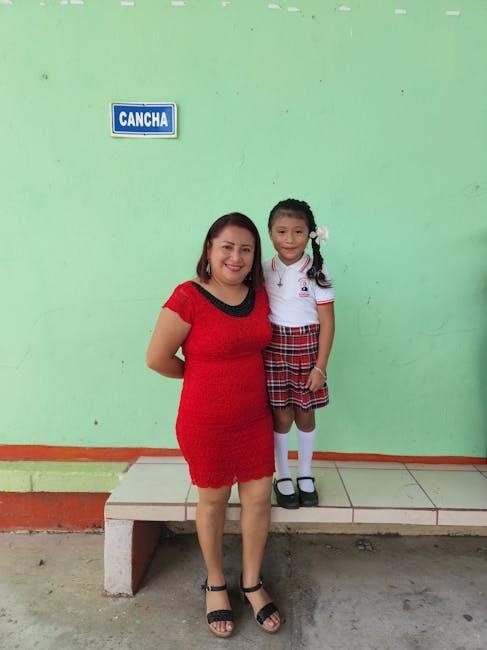Navigating your child’s school years can be both a joyful and challenging journey. As parents, we want nothing more than to see our children thrive academically, socially, and emotionally—but sometimes, knowing how to offer the right kind of support feels overwhelming. Being a truly supportive parent goes beyond helping with homework or attending school events; it’s about creating a nurturing environment where your child feels understood, encouraged, and empowered to grow. In this article, we’ll explore thoughtful, practical ways to stand by your child throughout their school experience, helping them build confidence and resilience every step of the way.
Table of Contents
- Understanding Your Child’s Unique Learning Style and Needs
- Fostering Open Communication to Build Trust and Emotional Safety
- Creating a Positive Home Environment That Encourages Academic Growth
- Collaborating Effectively with Teachers and School Staff for Consistent Support
- In Conclusion
Understanding Your Child’s Unique Learning Style and Needs
Every child approaches learning through their own unique prism, shaped by a combination of personality, strengths, and challenges. Some thrive with visual cues like charts and colors, while others absorb information best through hands-on experiences or auditory instructions. Recognizing these individual preferences not only helps your child engage more deeply but also fosters a sense of confidence and ownership over their educational journey. Pay attention to how your child reacts to different teaching methods and materials; sometimes it’s as simple as allowing more movement breaks or incorporating storytelling to spark interest.
Supporting your child extends beyond the classroom and involves practical adjustments that fit their natural rhythm. Consider integrating personalized strategies such as:
- Creating a quiet, distraction-free study space
- Using visual schedules or checklists to promote organization
- Encouraging questions and curiosity rather than rote memorization
- Balancing structured activities with creative play
By staying attuned and flexible, you can help your child navigate their academic years feeling understood and empowered — truly making learning a discovery rather than a chore.
Fostering Open Communication to Build Trust and Emotional Safety
Creating a home environment where your child feels safe to express their thoughts and emotions is essential for their emotional development. This means actively listening without judgment and responding with empathy. When children know their voice matters, they’re more likely to share their struggles and triumphs openly, deepening the parent-child bond. Simple acts like maintaining eye contact, validating their feelings with phrases like “I understand how that feels,” and asking open-ended questions can encourage meaningful dialogue.
Building trust through communication also involves setting clear expectations and being consistent in your reactions. Children thrive when they understand boundaries but feel secure enough to make mistakes and learn from them. Consider incorporating daily rituals such as mealtime check-ins or bedtime talks where emotions and experiences can be easily shared. Other ways to cultivate this atmosphere include:
- Modeling transparency: Share appropriate personal stories to show vulnerability.
- Encouraging problem-solving: Collaborate with your child on solutions to their concerns.
- Expressing unconditional support: Emphasize that your love isn’t tied to achievements or behavior.
Creating a Positive Home Environment That Encourages Academic Growth
Establishing a nurturing atmosphere at home where children feel safe to explore and learn is fundamental. This means creating a space where curiosity is encouraged and mistakes are seen as opportunities for growth. Consider setting up a dedicated study nook free from distractions, filled with all the necessary supplies and good lighting. Equally important is maintaining consistent routines—regular meal times, bedtimes, and study sessions—so children develop a healthy balance between work and rest. Celebrating small achievements, whether it’s completing homework on time or understanding a difficult concept, boosts confidence and reinforces a love of learning.
Communication plays a powerful role in shaping your child’s motivation. Make time for meaningful conversations, not just about grades but about their feelings, challenges, and interests. Show genuine interest by actively listening and validating their efforts. Introducing positive habits together can also foster teamwork and accountability; for example, reviewing a weekly planner or reading a book side-by-side. Here are a few guiding principles to keep in mind:
- Encourage questions and critical thinking rather than just rote memorization.
- Model curiosity and lifelong learning in everyday moments.
- Maintain patience and empathy during homework struggles.
- Create a growth mindset culture by emphasizing effort over perfection.
Collaborating Effectively with Teachers and School Staff for Consistent Support
Building a genuine partnership with your child’s teachers and school staff is essential for creating a stable and nurturing educational environment. Approach communication with openness and respect, ensuring that you actively listen and share insights about your child’s unique needs and strengths. Remember, these professionals have valuable perspectives that, when combined with your parental insight, form a comprehensive support system. Don’t hesitate to ask questions, seek clarification, and propose ideas—you are both working toward the same goal: your child’s success and well-being.
Consistency is key, and staying connected with the school team helps maintain that continuity. Here are a few ways to foster effective collaboration:
- Regular Check-ins: Schedule brief meetings or calls to review progress and address any concerns promptly.
- Shared Strategies: Align on behavioral expectations and learning approaches to reinforce routines at home and school.
- Positive Feedback: Celebrate achievements together, no matter how small, to motivate and build confidence.
- Resource Sharing: Exchange useful materials, tools, or community resources that can support your child’s development.
In Conclusion
Being a supportive parent throughout your child’s school years is one of the most meaningful gifts you can offer. It’s about more than homework help or attending school events—it’s about fostering a safe, understanding space where your child feels valued and heard. Remember, every child’s journey is unique, and your patience, encouragement, and unconditional love will help them grow into confident, resilient individuals. As you walk beside them through the ups and downs of school life, know that your support lays the foundation for their lifelong love of learning and self-belief. Keep showing up, listening closely, and celebrating every small victory—you’re making a difference that lasts a lifetime.
Related Products
-
Sale!
Frida Mom 2-in-1 Postpartum Pads, Absorbent Perine…
Mom Original price was: $19.99.$15.19Current price is: $15.19. -
John Deere Bubble Lawn Mower for Toddlers, Bubble …
Kids $29.99 -
Hanes Men’s EcoSmart Fleece, Pullover Crewneck Swe…
Clothing $9.31







